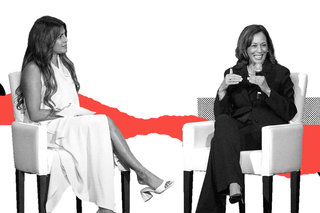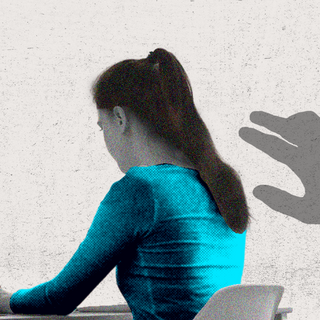
Priyanka Chopra Interviewing Kamala Harris Shows a Deeper Problem With Representation
Although ostensibly dealing with political questions, the narrative of the interview was about powerful women speaking — signalling how the latter overshadows the former.

Priyanka Chopra’s interview with American Vice President Kamala Harris was publicized with some familiar rhetoric: representation of women, of brown people, and above all, of brown women occupying a prominent space in the public sphere. The two discussed some political issues: Chopra asked Harris some questions about gun control, while also speaking to an audience about how America wasn’t able to crack a glass ceiling that India could, long ago.
But there’s something amiss: it’s the optics of the conversation, rather than the substance of the interview itself, that took center-stage. And this speaks to the problem with hyping up representation too much.
There’s nothing ostensibly wrong with Priyanka Chopra interviewing Kamala Harris. But it’s the presentation of the event that bears scrutiny: rather than focusing on the questions and answers themselves, much of the coverage centered around two icons of South Asian representation in conversation with another. “Since the very beginning, the world has undermined the power of women. We’ve been shunned and silenced, but thanks to the sacrifices and tenacity of so many selfless women, we are in a place today where we can come together and work collectively to right the wrongs,” Chopra said of the event in her Instagram caption. It equates representation in high-powered roles with socio-political, even cultural progress — an idea that falls apart under careful examination.
It’s true that women have held positions of power in India. Indira Gandhi was our prime minister much before many countries in the global north had women leading them. India has also had more than one woman serving as its President: today, Draupadi Murmu, an Adivasi woman, holds the post. These are, ostensibly, noteworthy achievements. And yet: India is ranked to be one of the world’s most dangerous countries for women, and its female labor force participation rates continue to drop. Violence against Dalit and Adivasi women is on the rise, and women and girls are being pushed deeper into poverty, as per recent projections. It shows that aspiring for power doesn’t necessarily translate into progress for all — but this is still the overwhelming rhetoric championed by privileged women.
Related on The Swaddle:
Why Representation in Politics May Not Address Systemic Oppression
When both Chopra and Harris are evaluated beyond what they represent, the facade of progress gives way to politics on shaky ground. Priyanka Chopra’s politics, when it comes to her home country, have been inconsistent at best, dangerous at worst. In the past, she tweeted hyper-nationalist support for a war with Pakistan; she met with the Prime Minister, and she all but declined to meaningfully respond to both instances when asked about them. She openly touts women’s rights and breaking silences, but she also took a vague, confusing stance during India’s anti-CAA-NRC protests, much of which was led by some of the most marginalized women in the country. She’s also called herself apolitical — preferring to label herself a humanitarian instead.
It’s a testament to how Priyanka Chopra wields wokeness strategically. That she sides with the status quo or remains silent about issues where taking a contrarian position would hurt her, speaks to a greater problem with hailing representation itself. Most mainstream conversations about it focus on the visible, the aesthetics — where being brown in a position of influence is enough.
As for Kamala Harris — her legacy is that she’s the first South Asian, first black, and first woman all at once occupying the vice presidency. This is a win for representation: but her track record shows that the people most harmed by Harris are those she is supposed to represent. James Baldwin once wrote: “In Harlem, Black policemen are feared even more than whites, for they have more to prove and fewer ways to prove it.” As Iman Sultan, writing for Bitch Magazine, observed in reference to this quote: “This axiom rings true today for people of color in government or law enforcement who often have to prove their allegiance to the same institutions responsible for our oppression. Not only do people of color in high places embody respectability politics and perform patriotism, but they also violently impose these values on the powerless and on those who decide to reject or challenge white-supremacist institutions.”
“Harris may look like us, and she may come from the same part of the world as us, but what price do we pay for representation?” Sultan adds.
Related on The Swaddle:
Why We Need to Re‑Examine ‘Brownness’ as an Identity Marker
The interview also touched upon reproductive rights, mansplaining, and pay parity — all important issues. But in this context, they become ways to bolster the credibility of both Chopra and Harris, without adding anything new to the conversations themselves. As figureheads of South Asian representation in entertainment and politics respectively, Priyanka Chopra and Kamala Harris are already progressive wins by default, by virtue of just existing within these spaces.
The conversations they have are thus safe, in that they are acceptable opinions to voice in public, with no repercussions or stakes involved. And this is the paradox of brown representation itself: it caters to a white, Eurocentric gaze, without changing anything structurally about white supremacy or other forms of power. It also homogenizes identity into binaries, discounting the hierarchies within. Priyanka Chopra and Kamala Harris, as prominent brown women in America, are in the position to talk about issues that many brown American women face. Take Thenmozhi Soundararajan’s revoked invitation at Google, where she was scheduled to talk about caste discrimination; or the fact that American universities are increasingly grappling with caste discrimination that affects South Asian students there. These issues, however, don’t find any mention in mainstream conversations about power or representation.
As The Swaddle noted earlier: “The best Brown representation we have is Hindu upper caste representation, assimilated nearly completely into American culture. Under the auspices of Brown representation, authenticity can be claimed just by being present as a Brown-skinned person in a predominantly White environment.” In the process, the narrative of representation itself turns potent political issues like gun reform and abortion into sanitized versions of themselves — overshadowed by the people who talk about them.
Representation matters. But sometimes, it also robs political issues — particularly those that impact the very people claimed to be represented — of their teeth.
Rohitha Naraharisetty is a Senior Associate Editor at The Swaddle. She writes about the intersection of gender, caste, social movements, and pop culture. She can be found on Instagram at @rohitha_97 or on Twitter at @romimacaronii.
Related


New Study Sheds Light on Why Men Initiate Sexual Advances in the Workplace
